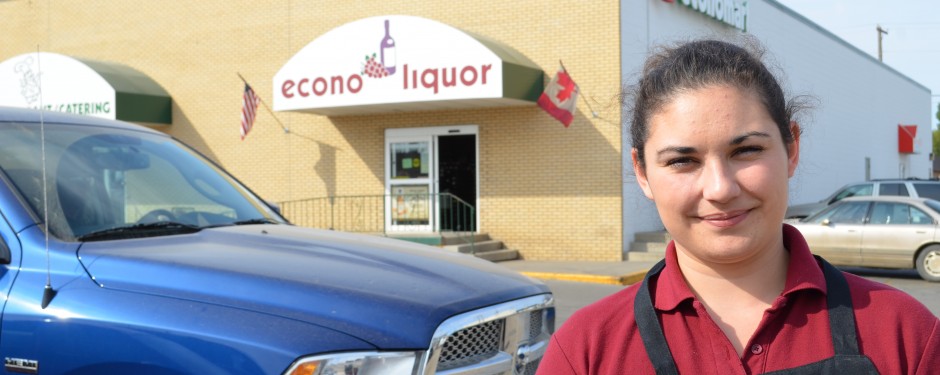
Story and Photo by Diane Richard
WILLISTON, N.D. — The oil fields of North Dakota have an unemployment rate of less than one percent. Employers here are desperate for workers. That’s why many area retailers have come to rely on temporary foreign labor to fry hamburgers and stock shelves.
But those employers will have to make new, permanent hires after September. The designated sponsor of the J1 student work visa, Maryland-based United Work and Travel, has canceled its western North Dakota program. A company spokesman said the J1 visa, intended for cultural exchange and temporary work, was not meeting its mission here.
“It’s a big deal for us. I’m very, very disappointed,” says Williston Mayor Ward Koeser. “That’s certainly not good news. I’m really troubled by that. I’m not sure what their reasons are.”
A spokesman for United Work and Travel, Kasey Simon, told Prairie Public the J1 visa is designed for businesses that need seasonal help—think summer beach resorts. The oil boom, however, presents a permanent need. The J1 visa is also supposed to emphasize cultural exchange, not raw capitalism.
“From my perspective, it’s a great program that works well,” Koeser says. “Probably there’s no place in the country where these students can have a better interaction with the natives, with people from all over the country who are coming here. So it’s a great work experience for them. I think they’re making good money. At the same time, they’re really helping out our local business.”
These days local businesses, hub of oil country, resemble the United Nations. Students from Jamaica, Turkey, Bosnia and Macedonia take your orders, clean your rooms, fry your chicken. The students are drawn by the region’s ample jobs and high wages.
Elitsa Dimitrova — Ely, for short — works the deli at Economart in Williston. Ely is from Sofia, Bulgaria. She’s spent the last three months working here at this grocery store.
Reporter Diane Richard: “Why did you come to North Dakota specifically?”
Elitsa Dimitrova: “Money.”
Ely’s a college student back home. She came here for an American immersion—and a paycheck. She earns nine dollars an hour, almost two dollars more than federal minimum wage. That hardly offsets what she’s been paying to rent a house with four friends. Rents in Williston rival those in New York City. But that’s the only similarity.
Reporter Diane Richard: “Is North Dakota sort of what you expected from your American experience?”
Elitsa Dimitrova: “Well, not really. I expected more people. It’s like the country, countryside here.”
On this day, Ely is planning her next stops to Miami and New York.
Reporter Diane Richard: “Today’s a big day for you, right?”
Elitsa Dimitrova: “Yah, it’s my last day here. I’m excited and sad, at the same time.”
Reporter Diane Richard: “I saw your friend hugging your coworkers goodbye.”
Elitsa Dimitrova: “They made us presents, like balloons and candies and some nice bracelets. These are not just people you work with. These are friends.”
That’s exactly the sort of culturally immersive experience Mayor Koeser wants to continue to take place in Williston. He says temporary foreign workers are critical to the service industry here. In 2010, fifteen J1 visas were issued for work in North Dakota; in 2012, that number grew to one thousand.
Vern Brekhus is manager at the Williston McDonald’s. Over the past two years, about a third to one-half of his work force has been international students. His reaction upon hearing of termination of the J1 program? “Disbelief,” Brekhus says. “I was like, oh crap, you’ve got to be kidding me. This is not going to be good. From a working standpoint, it’s not good. From a business standpoint, it’s not good. The whole program is so beneficial to everyone. One of my crew members told me, ‘I will never go to Brazil. I will never go to Ukraine. Having them come here, I can at least experience their culture a little bit, and they can experience ours.’ Losing that is going to be a shock.”
Jeff Peck is one of the franchise’s owners. He’s also alarmed. “We’re heavily dependent on the program to provide the service and meet the demand that the community has encountered in the last two to three years,” Peck says. “It would be an absolute hardship if we lost our J1 students.”
Mayor Koeser says losing the student workers is a big blow to local hospitality. “It’s going to be really difficult for us,” Koeser says. “I actually envision restaurants that will have to be closed part of the time. Everybody is going to have to try to find somebody to replace them. And that will not be easy. I think that’s going to be detrimental to our community.
At McDonalds, that might mean shorter hours in the storefront and longer hours — and lines — at the drive-thru.
One Comment
Leave a Reply
No related posts.

















I am a Jamaican and I have been to Dickinson North Dakota 2 summers, 2 of my best summers ever. I love small towns like Dickinson because people are nicer, it’s easier to get around and it’s easier for foreigners to feel comfortable . Unlike big cities persons who are impolite , make you feel uncomfortable just don’t care as much . There is good and bad everywhere but small towns like Dickinson have a little more good than big cities like New York or Boston. I have friends who’ve been to big cities on the programme and had a bad time. Managers are nicer , employees try to make you feel comfortable in small towns . Yes some small towns pay more but rent is normally higher , other bills , especially if you cant cook a great deal of you money goes into dining out. In the small town you meet new friends from America and other countries ,even when it’s your day off you still drop by work to say hi because you miss everyone . Also the programme is called WORK AND TRAVEL after you finish working you go to big cities like New York for shopping , L.A., Orlando for theme parks to really travel the country and have a full American experience . Imagine the persons who work in the big cities only visit other big cities they don’t know what small towns look like seeing farms in the US seeing buffalos not in a zoo setting but in their natural habitats , only in the country areas. Also visiting fun cultural experiences during 4th of July weekend like Rough riders Rodeo, learning about who the Roughriders were. I Love Dickinson , my friends there are more like family because I even have an American Mom there.My friends who went to big cities comparing their summer to my summer I had more fun than they did. It’s not only learning about American culture but learning about people from countries that you’ve never heard of such as Azerbaijan, that gave me some pronunciation troubles hahah. Putting different people from different lifestyles and different levels of cleanliness in one house is hard at times but we make it work . Whenever I talk to my friends from Dickinson on skype and they ask when are coming back I want to cry because I miss them a lot , that’s one of the main reasons I went back there a second time .
So cutting out jobs from North Dakota will be robbing persons of wonderful experiences and memories and also robbing the citizens from these places the experience of learning about other cultures and realizing that is there is life outside of North and South Dakota.
I would love to go again even on an internship programme since I’ve just recently graduated college and im 22 years old. Maybe that’s what United Work and Travel needs to do to help North Dakota out with its employee shortage by having internship programmes because visiting for three months sometimes you really don’t get the full vibe of the place.
Tara-Lee Edmond
A PERSON WHO LOVES DICKINSON NORTH DAKOTA